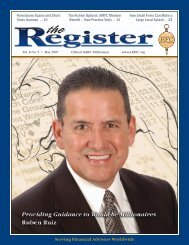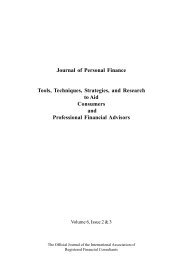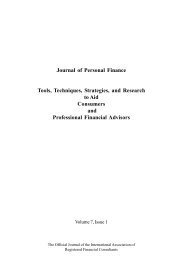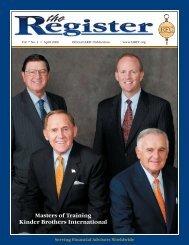Originator: Positive Mental Attitude W. Clement Stone - iarfc
Originator: Positive Mental Attitude W. Clement Stone - iarfc
Originator: Positive Mental Attitude W. Clement Stone - iarfc
You also want an ePaper? Increase the reach of your titles
YUMPU automatically turns print PDFs into web optimized ePapers that Google loves.
CONSUMER<br />
Paul Richard, RFC ®<br />
FOCUS<br />
www.ICFE.info<br />
For Veteran and Active Duty Service Members<br />
Credit Monitoring is a Feel Good Answer, But a False Sense of Security<br />
Veterans, Active Duty Service Members<br />
and Consumers whose personal<br />
information was stolen have been offered<br />
a salve — credit monitoring — which is a<br />
feel good response, but provides a false<br />
sense of security. Credit monitoring is to<br />
identity theft, what bumper stickers are<br />
to politics, not very much.<br />
Despite the hype, when it comes to<br />
identity theft prevention measures,<br />
relying on credit monitoring is similar to<br />
placing only one smoke detector in a<br />
three story home<br />
This alert is for potential victims to<br />
carefully review and understand the<br />
limitations of credit monitoring. Credit<br />
monitoring will not alert the consumer if<br />
someone has obtained a driver’s license,<br />
birth certificate, Social Security card, or<br />
used their name during interactions with<br />
law enforcement, resulting in arrest<br />
warrants or erroneous criminal records.<br />
Many ID theft services companies<br />
actually claim that their service<br />
“protects” or even “guarantees against”<br />
identity theft. This is a marketing claim<br />
proven wrong time and time again and<br />
also one that is clearly disputed by<br />
privacy experts and consumer<br />
advocates alike.<br />
Credit Monitoring Services Limitations<br />
Most credit monitoring services only<br />
monitor one bureau. Some services<br />
provide an initial three-bureau report on<br />
the first order, and then revert to<br />
monitoring only one. Consumers should<br />
carefully read the fine print before<br />
signing up. While major accounts such<br />
as home and auto loans are typically<br />
reported to all three bureaus, non-major<br />
account creditors often report to only one<br />
bureau. If the service only monitors one<br />
bureau, it will show only what is reported<br />
to that bureau and may miss anything<br />
and everything else.<br />
Many creditors report to the bureaus only<br />
once per month or quarter, and credit<br />
bureaus only report what is reported to<br />
them. Expensive daily or weekly<br />
Institute of Consumer Financial Education<br />
monitoring may provide early notice of<br />
inquiries, but many potential credit<br />
grantors regularly make inquiries for preapproved<br />
offers, and inquiries often are<br />
not differentiated or explained. If an<br />
account is opened, it may still be some<br />
time before it is reported. In cases<br />
involving in-store or utility accounts, the<br />
account may never be reported until after<br />
it has been sent to collections.<br />
With very rare exceptions,<br />
credit monitoring does not monitor<br />
specialty-reporting companies, such as<br />
ChoicePoint, or check verification<br />
companies.<br />
Credit monitoring will not alert the<br />
consumer if someone has obtained a<br />
driver’s license, birth certificate, Social<br />
Security card, or other such documents in<br />
their name. It also will not alert the<br />
consumer if someone has used their<br />
name during interactions with law<br />
enforcement, resulting in arrest warrants<br />
or erroneous criminal records. Credit<br />
monitoring will not report to the victim in<br />
a timely fashion, if at all, when an identity<br />
thief has taken a job using the victim's<br />
name and Social Security number — in<br />
some States, this type of employment<br />
fraud approaches one-third of all identity<br />
theft cases, and causes significant<br />
financial cost, unexpected tax<br />
consequences, and embarrassment to<br />
the victim.<br />
Conclusion: Credit monitoring may be<br />
useful to alert the consumer that an<br />
account has been opened in his or her<br />
name, but afterwards the task of<br />
disputing the accounts and resolving the<br />
matter still falls squarely on the<br />
consumer’s shoulders. In most cases,<br />
experts contend that consumers may<br />
be far better off ordering their<br />
reports themselves, and staggering<br />
their requests throughout the year.<br />
FACTA-mandated free reports are<br />
available in all fifty states, so this may<br />
be performed for free. If the consumer is<br />
a victim of fraud, or has been denied<br />
credit due to information on their credit<br />
report, he or she can also obtain a copy<br />
of their report for free.<br />
619 239 1401<br />
Other options available include “optingout”<br />
of pre-screened credit offers, “Fraud<br />
Alerts”, and credit “Freezes”.<br />
Fraud alerts are statements that may be<br />
included in the consumer’s credit report<br />
intended to alert potential credit issuers<br />
that the consumer is or may be a victim<br />
of fraud. A fraud alert is temporary, 90<br />
days in length, it may be extended,<br />
however, at the consumer’s written<br />
request for up to seven years. Fraud<br />
alerts are sometimes completely ignored,<br />
but an alert can stop many instant credit<br />
applications. The alert should include a<br />
request for potential credit grantors to<br />
contact the consumer directly at a<br />
specified number to confirm the<br />
legitimacy of the application before<br />
granting credit.<br />
Where available, credit freezes are a<br />
powerful tool that essentially prevents<br />
third parties from accessing the<br />
consumer’s credit file, until he or she<br />
instructs the credit bureaus to unfreeze or<br />
“thaw” the report. This request can be<br />
general or only for specific companies. To<br />
be effective, the consumer should place<br />
a freeze on their file at each of the three<br />
bureaus. States permitting all consumers<br />
to request a credit file freeze are<br />
California, Colorado, Connecticut, Florida,<br />
Illinois, Kentucky, Louisiana, Maine,<br />
Minnesota, Nevada, new Hampshire, New<br />
Jersey, new York, Oklahoma, North<br />
Carolina, Utah, Vermont, and Wisconsin.<br />
States that permit only ID theft victims to<br />
request freeze are Hawaii, Kansas, South<br />
Dakota, Texas and Washington. <br />
The author,<br />
Paul Richard,<br />
RFC ® is the<br />
Executive<br />
Director of the<br />
ICFE, founded<br />
by Loren<br />
Dunton. Paul is<br />
also the author<br />
of the Certified<br />
Credit Report<br />
Reviewer and is a highly regarded identity<br />
theft prevention specialist.<br />
ICFE@cox.net<br />
The Register • August 2006 Page 21
















